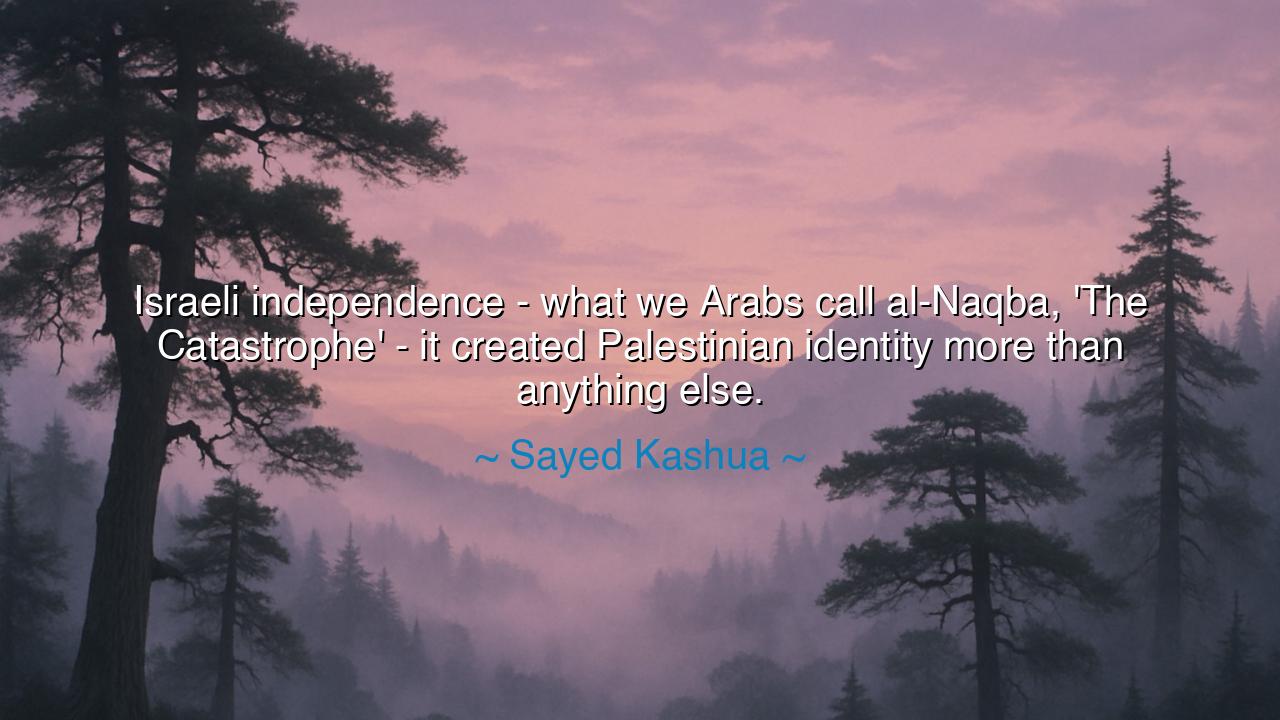
Israeli independence - what we Arabs call al-Naqba, 'The
Israeli independence - what we Arabs call al-Naqba, 'The Catastrophe' - it created Palestinian identity more than anything else.






The words of Sayed Kashua, spoken with the sorrowful wisdom of one who straddles two worlds, reveal a truth both tragic and profound. When he said, “Israeli independence—what we Arabs call al-Naqba, ‘The Catastrophe’—it created Palestinian identity more than anything else,” he was not merely describing a moment in history, but the birth of a wound that became a people. His words capture the paradox of human destiny: that identity is often forged not in triumph, but in loss; not in the joy of creation, but in the ashes of destruction. This quote stands as both lament and revelation, for it tells how one nation’s freedom became another’s exile, and how, from the ruins of that exile, a new consciousness arose.
To understand the heart of Kashua’s statement, one must return to 1948, the year of Israel’s founding. For the Jewish people, it was the culmination of centuries of longing—a return to the ancient homeland after unimaginable suffering and dispersion. But for the Palestinians, it was the beginning of dispossession. Over 700,000 Arabs were displaced from their towns and villages, forced to flee across borders or into refugee camps. What the Israelis celebrated as Independence Day, the Palestinians mourned as al-Naqba, The Catastrophe. It was not only the loss of land that scarred them—it was the sudden shattering of continuity, the erasure of home, the scattering of a people who until then had no reason to think of themselves as separate or singular.
Kashua’s insight lies in this transformation: that Palestinian identity, as we know it today, was born from displacement. Before 1948, the people of that land were part of a larger Arab fabric, bound by faith, region, and tradition. They called themselves peasants of Jaffa, merchants of Jerusalem, farmers of Galilee—but the term “Palestinian” carried no sharp edge of distinction. It was the trauma of loss that wove their scattered existence into a single story. In exile and occupation, they came to know themselves as one people, defined not by what they possessed, but by what had been taken from them. Thus, catastrophe became creator—a cruel irony that runs through the history of nations.
There is a parallel in the chronicles of humankind. When ancient Israel itself was carried into Babylonian exile, the same alchemy of suffering took place. A people uprooted from their homeland, their temple destroyed, found in their sorrow the power to preserve themselves through memory, law, and faith. It was in exile that they became truly one. In much the same way, Kashua sees that Palestinians, driven from their soil, began to define themselves through remembrance and longing. Their identity became not merely a question of geography, but of endurance—the steadfast refusal to forget who they were, even when the world no longer recognized their name.
In the style of the ancients, we may say: identity is the child of both joy and grief. It is shaped by what we celebrate, but tempered by what we survive. The Palestinian people, through decades of exile, occupation, and diaspora, have become a living testament to this truth. Their music, their poetry, their art—all carry the voice of a nation that exists as much in spirit as in soil. Sayed Kashua, himself a Palestinian citizen of Israel, writes from within this paradox, belonging to both worlds yet fully accepted by neither. His reflection is not accusation—it is mourning mixed with insight, a recognition that history’s blessings are often double-edged.
But his words also carry a deeper lesson for all humanity: that the power of memory can both heal and imprison. To remember suffering is to preserve identity, but to live forever within that memory is to remain bound by it. For every people that has endured catastrophe, there comes a time to turn pain into purpose. The Jews rebuilt their homeland; others rebuilt their nations after conquest and exile. So too must every people who has known loss learn to carry their grief not as a chain, but as a banner—a reminder of endurance, not only of tragedy.
Therefore, let this teaching be passed down: from loss can come strength, from exile can come unity, and from catastrophe can come the birth of new nations. But only if remembrance is balanced with renewal. To the Palestinians, and indeed to all peoples scarred by history, the challenge is to transform al-Naqba from a wound into a witness—from something that divides, into something that defines with dignity.
The practical path is this: honor the past, but do not let it hold the future hostage. Teach your children where they came from, yet also show them where they may go. Let the memory of catastrophe kindle compassion rather than vengeance, resilience rather than despair. For as Sayed Kashua reminds us, the deepest identities are not given—they are born, painfully but powerfully, through the fire of history. And in that fire, even the shattered can become whole again.






AAdministratorAdministrator
Welcome, honored guests. Please leave a comment, we will respond soon